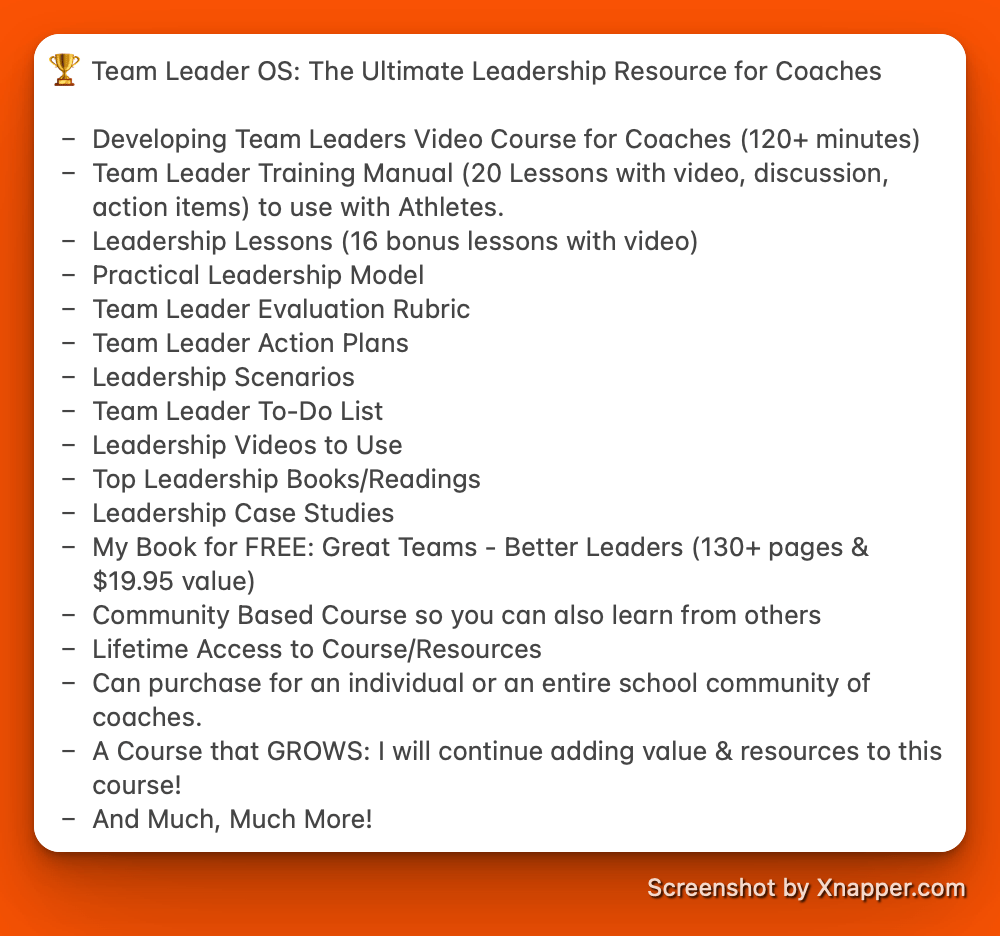Good morning! A warm welcome to the 185 new subscribers who joined this week. We are happy to have you on board!
Here's what's coming:
5 Steps to Deal with Bad Apples 🍏
Tommy LaSorda Gold 🥇
Jeff Beck on Preparing the Path…🚶
Read Time ~ 5 minutes.
Let's dive in.
Thanks to our sponsors who keep this newsletter free for 5500+ readers.
COMING SOON! I asked my READERS & COACHES what their most significant needs & challenges were. The overwhelming answer: Developing Leadership Skills in Players. So I am building something BIG. Coming this summer! 👇
🏆 Team Leader OS: The Ultimate Leadership Resource for Coaches.

💭 ONE THOUGHT
Bad Apples.🍏
You have probably heard the phrase that “one bad apple can spoil the whole bunch.”
There are few things harder to deal with as a coach.
How do coaches address a player who is sabotaging the team culture behind the scenes?
This player is often called the “team cancer” or the “bad apple.”
A player whose negativity spreads to others and is destroying a team culture.
So what can you do as a coach?
Before we dive in, the absolute most crucial thing for a coach to do is to be proactive. To try and address this BEFORE it gets to this point.
It is critical to focus on building your team leaders and team culture each and every day. This does not guarantee the prevention of all “bad apples,” but it can help prevent most.
I have written a lot about building Culture, including my two books, Culture WINS and Culture WINS 2. These books provide practical ways to help create a winning culture.
I have also written about many things that can destroy a team culture, from both coaches and players. Here is one of my threads on ten ways you can destroy a team culture.
These culture killers can quickly become your bad apples. What do bad apples do to a team if they are not addressed? They…
Destroy team morale
Hurt team performance
Create distractions and drama
Undermine team leadership
Damage team reputation
But what do you do? How do you deal with a bad apple?
Bad apples must be addressed, and great coaches always address these players. On great teams, the bad apples are addressed early by team leaders.
The Reverend Martin Luther King, Jr., wrote a famous letter from the Birmingham jail in 1963 to his fellow clergymen. He said his people “could understand and endure the hatred of their enemies, but was most exasperating was the silence and inaction of their supporters.”
As a coach, this is where the solution often lies. We must coach our Team Leaders about leadership. We must teach our players how to rise above the peer pressure of the “bad apple.” We must teach our players how to hold others accountable.
What is allowed happens.
This comes from you as a coach as well as what is what is allowed from team leaders.
Your team leaders must understand their role and the importance of it in regard to the team's success.
Even with the best intentions of team leaders, the bad apple can persist. And if this happens, they must be addressed by the coach. It is never easy, but here are five steps you can take that will help address the issue of a bad apple on your team
1: Identify the problem.
The first step in addressing a bad apple on your team is to identify the problem.
Sometimes it happens behind the scenes.
As coaches, you may not know if it is even going on.
This is why it is critical to have a good relationship with your team leaders. Talk to them often. Ask them about the team culture in the locker room or outside of school.
They know before you do if there is a bad apple.
Once you have a clear understanding of the problem, the issue, or the person, you can begin to develop a plan to address it.
2: Address the issue directly.
Once you have identified the problem, it's essential to address it directly with the player.
Never avoid addressing a bad apple. It will always backfire.
Meet with the player one-on-one.
Discuss specific instances of negative behavior. Outline the impact that their behavior is having on the team as a whole.
Be firm but fair, and avoid attacking the player personally.
3: Set clear expectations.
In addition to addressing the problem, setting clear expectations for the player moving forward is critical.
This might involve outlining behaviors that are not acceptable and explaining the consequences if those behaviors continue.
Ensure the player understands what is expected of them, and be clear about the consequences of failing to meet those expectations.
4: Provide support.
Sometimes, a bad apple on your team may be struggling with personal issues, mental health, family issues, or other challenges affecting their behavior.
As a coach, it's crucial to provide support and resources for these players.
It may be connecting them with a counselor or therapist or simply providing a listening ear.
Show the player that you care about their well-being and are invested in helping them succeed on and off the field.
5: Take action.
If the player continues to be a problem despite your best efforts to address the issue, it may be necessary to take more severe action.
This might involve benching the player, suspending them from the team, or dismissing them altogether.
While these decisions can be difficult, they are sometimes necessary to maintain the integrity of the team and ensure that all players are held accountable for their behavior.
Coaches: Always remember that your number one job is to build your Team Culture. A bad apple can sabotage your team culture despite your best efforts.
Always address your bad apples.
Protect your culture and use this five-step process as a guide!
📜 TWO QUOTES
"The difference between the impossible and the possible lies in a person's determination."
“Excuses are the nails used to build a house of failure.”
🐦 THREE TWEETS
🙋🏼♂️ POLL QUESTION OF THE WEEK:
How do you typically handle a "bad apple" player on your team?
Last Week’s Poll Question:
Do you believe that failure exists?
🟩🟩🟩🟩🟩🟩 Yes, failure is a real and tangible experience that we all encounter. (6)
🟨🟨🟨🟨⬜️⬜️ No, failure is just a subjective interpretation of setbacks and challenges. (4)
🟨⬜️⬜️⬜️⬜️⬜️ It depends on the situation and context - sometimes failure exists, and other times it doesn't. (2)
🟨⬜️⬜️⬜️⬜️⬜️ I'm not sure - I think there are arguments for both sides of the debate. (1)
📚 BOOKS AND FREE RESOURCES

👀 LOOKING FOR MORE?
If you are looking, here are a few other resources and services I provide:
Contact Me: Greg Berge, [email protected]

